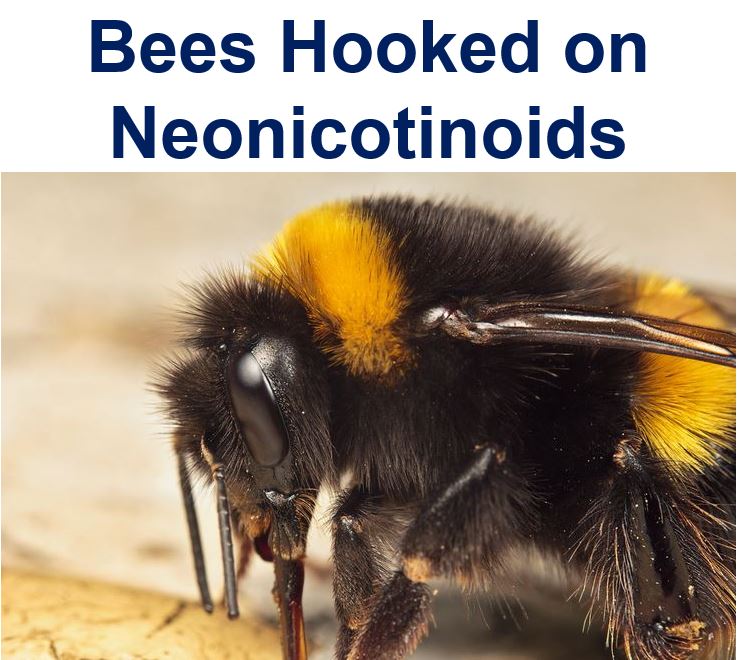Bees prefer nectar containing neonicotinoid pesticides rather than neonicotinoid-free nectar, researchers found. In fact, they believe bees have become addicted to neonicotinoid pesticides in the same way smokers are hooked to nicotine. This means they are likely to be exposed to higher levels of toxins.
Like nicotine, the neonicotinoids act on certain kinds of receptors in the nerve synapse, i.e. they work on brain cells making the bees want more, just like nicotine works on human brain cells making people desire another ‘fix’.
Scientists at Newcastle University in England and Trinity College Dublin say this could increase bees’ risk of exposure to high levels of pesticides.

The bees appeared to be hooked on neonicotinoid pesticides just like humans with nicotine.
Previous studies have suggested that this kind of exposure might affect bees’ health and overall fitness.
In this latest study, published in the academic journal Nature, lead scientist Professor Geraldine Wright, who works at the Institute of Neuroscience at Newcastle University, and colleagues discovered that honeybees and buff-tailed bumblebees could not taste the three most commonly used neonicotinoid pesticides, therefore they did not avoid them.
Bees preferred neonicotinoid-laced food
In fact, the authors noted that the opposite occurred. The insects clearly preferred food containing neonicotinoid pesticides. The bees were presented with neonicotinoid-laced and neonicotinoid-free food, and consumed much more of the food with the pesticide chemical in it.
Bumblebees appeared to be more hooked than the honeybees – they ate more of the food containing pesticides compared to the honeybees, which means they were exposed to higher doses of toxins.
Pollinating insects including bees are crucial for increasing crop yields. Studies have estimated their value to be worth at least €153 billion ($164bn, £109bn) annually worldwide.
Pollinating insects can be exposed to pesticides in floral nectar and pollen. A number of controversial studies have demonstrated that neonicotinoids are bad for bee foraging and colony fitness.
Over the years, public concern has been growing over the impact neonicotinoids might have on bees and other pollinators. The European Union introduced a temporary ban on the use of neonicotinoid pesticides on flowering crops in April 2013. Whether the ban is lifted or continues depends on what further scientific studies reveal.
Bees at risk of poisoning
Professor Wright said:
“Bees can’t taste neonicotinoids in their food and therefore do not avoid these pesticides. This is putting them at risk of poisoning when they eat contaminated nectar.”
“Even worse, we now have evidence that bees prefer to eat pesticide-contaminated food. Neonicotinoids target the same mechanisms in the bee brain that are affected by nicotine in the human brain.”
“The fact that bees show a preference for food containing neonicotinoids is concerning as it suggests that like nicotine, neonicotinoids may act like a drug to make foods containing these substances more rewarding.”
“If foraging bees prefer to collect nectar containing neonicotinoids, this could have a knock-on negative impact on whole colonies and on bee populations.”
Professor of Botany Jane Stout, the Principal Investigator in the School of Natural Sciences at Trinity College Dublin, said:
“Our findings imply that even if alternative food sources are provided for bees in agricultural landscapes where neonicotinoid pesticides are used, the bees may prefer to forage on the neonicotinoid-contaminated crops.”
“Since neonicotinoids can also end up in wild plants growing adjacent to crops, they could be much more prevalent in bees’ diets than previously thought.”
The study formed part of the Insect Pollinators Initiative, which was jointly funded by the Natural Environment Research Council (NERC), Defra, the Biotechnology and Biological Sciences Research Council (BBSRC), the Scottish Government, the Wellcome Trust, the Science Foundation Ireland, and the Irish Research Council.
Citation: “Bees prefer foods containing neonicotinoid pesticides,” Sébastien C. Kessler, Erin Jo Tiedeken, Kerry L. Simcock, Sophie Derveau, Jessica Mitchell, Samantha Softley, Jane C. Stout & Geraldine A. Wright. Nature. Published online 22 April, 2015. DOI: 10.1038/nature14414.
Video – Pesticides harm wild bees
In a separate Swedish study, also published in Nature, researchers found pesticides affected bee populations. In this video, Maj Rundlöf, an ecologist at Lund University, talks about their findings.
